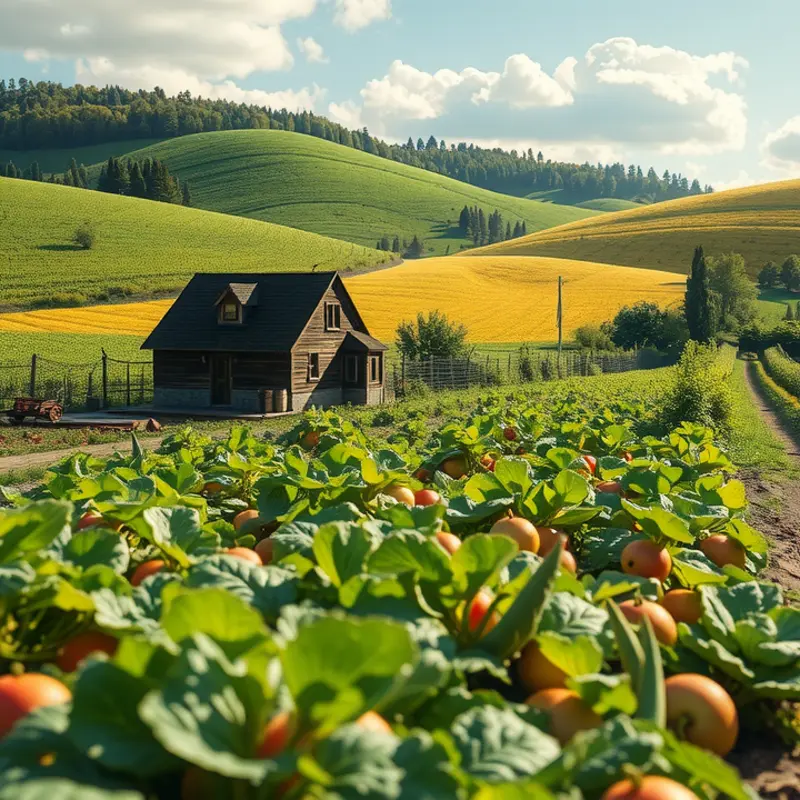Every bite we take carries the potential to either support or challenge the environment. Our food choices contribute significantly to greenhouse gas emissions, water usage, and biodiversity loss. By understanding the environmental impact of what we consume, environmentally-conscious individuals can make informed decisions that champion sustainability. From selecting seasonal produce to reducing food waste, each deliberate choice shapes the world we live in and helps to foster a healthier planet for future generations.
Understanding the Footprint of Food

Every meal leaves an imprint on our environment. This footprint includes greenhouse gas emissions, land use, and water consumption. Understanding these factors can guide us in choosing foods that are less taxing on our ecosystem. When we break down the environmental impact, we see that some foods weigh heavier than others in these aspects.
Greenhouse Gas Emissions: The production of meat, particularly beef and lamb, contributes significantly to greenhouse gas emissions. This footprint is due to the energy-intensive nature of raising livestock, including feed production and cattle methane emissions. Conversely, plant-based foods generally have a lower carbon footprint. For example, legumes and vegetables require fewer resources and generate fewer emissions.
Land Use: The amount of land required to produce different foods is another crucial factor. Livestock farming demands vast tracts of land for grazing and growing feed crops, resulting in deforestation and habitat loss. On the flip side, plant-based foods typically require less land. Incorporating more fruits, vegetables, and grains into your diet can reduce the overall land use associated with your meals.
Water Consumption: Water usage varies significantly across food types. Meat and dairy production are notoriously water-intensive, needing vast amounts of water for animal hydration and feed crop irrigation. In contrast, most plant-based foods require less water. For instance, lentils and beans are more water-efficient than poultry or beef, making them an eco-friendlier protein source.
Various diets offer different environmental footprints. Exploring plant-based diets may lead to reduced emissions, lesser land use, and lower water demand. Emphasizing local produce can also cut down transportation emissions. Organic foods might promise fewer pesticides but are not always more sustainable due to potential higher land use.
For eco-conscious eaters, balancing these factors is key. While organic farming has its advantages in reducing chemical use, not all organic foods have lower footprints. Developing habits such as mindful eating and understanding food origins can align personal health with environmental stewardship. By considering the whole picture—from cultivation to consumption—dietary choices can become powerful tools for positive environmental impact.
To further enhance your knowledge of eco-smart practices at home, consider exploring tips to improve eco-friendly kitchen storage. This knowledge complements dietary choices by extending sustainability into food storage and preparation.
Practical Steps for Sustainable Eating

To create an environmentally-friendly diet, conscious choices are key. By supporting local farmers, selecting seasonal produce, reducing meat consumption, and minimizing food waste, you can positively impact our ecosystem.
Support Local Farmers
Purchasing food from local sources reduces the carbon footprint, as these products require less transportation. Local food systems also support biodiversity, fostering a relationship between consumers and their community. Frequent local farmers’ markets or join a community-supported agriculture program to enjoy fresh, nutrient-rich produce while promoting sustainable farming practices.
Select Seasonal Produce
Choosing fruits and vegetables in their natural harvesting seasons reduces reliance on energy-intensive growing methods and long-distance transportation. Seasonal produce not only tastes better but is often more economical. Consider using a local seasonal produce calendar to guide your choices and inspire variety in your meals.
Reduce Meat Consumption
Meat production is a significant contributor to greenhouse gas emissions and deforestation. By reducing your meat intake, you can help decrease these environmental impacts. Consider adopting practices like Meatless Mondays, or explore plant-based proteins such as legumes, nuts, and seeds. Check out easy plant-based eating for tips on incorporating more plant foods into your diet.
Minimize Food Waste
Food waste contributes to methane emissions as it decomposes in landfills. Combat this by planning meals ahead of time and using leftovers creatively. Composting at home can also turn waste into valuable nutrition for your garden. For tips on reducing waste in the kitchen, explore strategies on how to safely store and extend the life of your ingredients.
Meal Planning and Prep
Planning meals helps avoid the impulse to buy unnecessary food, reducing waste and promoting balanced eating. Start by crafting a weekly menu based on your household’s needs and preferences. Once established, batch cooking can save time and energy, ensuring you have ready-to-eat meals that prevent last-minute unsustainable choices.
Mindful Eating
Practicing mindful eating not only enhances your relationship with food but also encourages sustainability. By being conscious of each bite and acknowledging your food’s journey from farm to table, you foster a stronger appreciation for your meals. This practice helps reduce overeating and waste, aligning your diet more closely with environmental goals.
Adopting these practices creates a roadmap to sustainable eating. Each step, though seemingly small on its own, contributes collectively to a positive environmental impact.
Final words
The choices made at breakfast, lunch, and dinner resonate far beyond personal health; they echo through ecosystems and impact the planet’s future. By understanding the environmental footprints of various foods and implementing actionable strategies for sustainable eating, everyone can contribute to a healthier world. Small changes, like opting for local produce or planning meals effectively, can create significant ripples in our consumption patterns. Together, we can help nurture the Earth for generations to come, empowering each other to make eco-friendly choices that matter.








